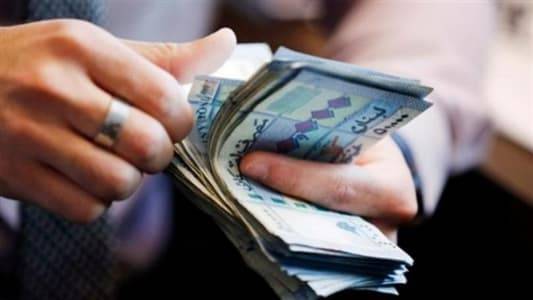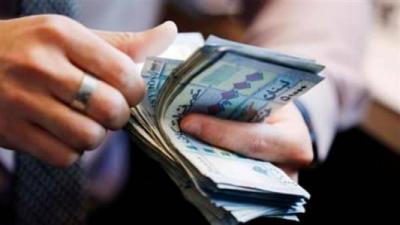It became clear from the meeting held yesterday by the Finance and Budget Committee with Finance Minister in the caretaker government, Youssef Khalil, that there is a step back or a fluctuation regarding the exchange rate related to certain taxes. In the statements released after the meeting, there is an indication that the budget did not adopt a new specific exchange rate for all transactions, and that tax decisions need to be frozen with a view to modifying them on one hand and adopting a "suitable" exchange rate for them on the other.
It has not been more than two months since that budget was approved, and it has become apparent that it was merely a "boiled egg" intended for two purposes: the first being populist, and the second being deceptive: increasing the salaries of public sector employees, and claiming that a condition set by the International Monetary Fund has been fulfilled. In this context, and others related to the exchange rate in general, several observations can be made:
### Unhealthy Trajectories to Lose the Thread
First: The budget was fundamentally undermined when Youssef Khalil's political reference (Speaker of Parliament and Head of the "Amal" Movement, Nabih Berri) refrained from appearing as the advocate for modifying the exchange rate to adopt what has been termed the customs dollar. After populist maneuvers and an intentional "losing of the thread,” a decision was issued to adopt that dollar at a rate of 15,000 Lebanese pounds starting from December 1.
The surprise came from where it should not have, as intensified disagreements emerged between the ministers of economy, industry, agriculture, and finance over specific applications regarding what is exempt and what is not regarding the application of the new price. To this day, no final lists have been issued, indicating that all the meetings held over the course of nearly a year in preparing the budget have gone to waste, in a government struggling with both the most complex and simplest decisions alike, influenced by "lobbying" from traders and industrialists, in addition to populists from all walks of life. Everyone cloaks themselves in tales of people’s interests, the national economy, and public finances.
### Rising Prices Elsewhere... Specifically Related to the Exchange Rate
Second: Discussions revolve around the high costs that could trigger a new round of hellish inflation due to the customs dollar and new taxes. However, nearly all involved parties ignore the core issue or stand powerless before it: that the inflation primarily arises from the rising exchange rate of the dollar, as the country imports at least 80% of its needs. Between the day the budget was approved on September 26 and today, the exchange rate in the parallel market has risen by about 13 to 14%. Consequently, prices have risen by this ratio, if not more. In contrast, the average rates of price hikes due to adopting a new customs dollar ranged theoretically between 20 and 25%, in addition to accumulated inflation reaching 1400% since the beginning of the crisis.
This additional rise could have been bearable if the markets were well-regulated and monitored, and if there were no smuggling and customs evasion at the crossings alongside falsification of disclosure data. But the persistent issue remains the deteriorating exchange rate day after day, which is the primary and ultimate pressure on the consumer and the citizen in their livelihood. Therefore, the discussion about the customs dollar and its effects remains marginal in the face of the need to unify exchange rates and adopt a flexible average as the IMF requests, along with a new monetary policy accompanied by the promised reforms, particularly concerning fiscal policy, the banking sector, and the Central Bank of Lebanon. This is what both the political and monetary authorities evade for various reasons, the most notable being the ongoing evasion of properly distributing losses, benefiting some from the multiplicity of exchange rates, and having no genuine intention for radical reforms that contribute to starting the journey toward stability and growth, which would inevitably lead to a relatively balanced exchange rate, stabilizing at a certain level where price increases and inflation rates cease.
### What was Said to Be a Step Towards Unifying Exchange Rates Proved to Be Just a Makeshift Solution
What was described as a move toward unifying exchange rates turned out to be merely a patchwork to increase revenues against expenses, particularly the increase in employees' salaries.
### Youssef Khalil Brought No New Reforms
Third: There is no doubt that increasing public revenues through new tax revenues is a natural point in principle. But does what Youssef Khalil adopted in 2022 qualify as reformative in this aspect? Observers only see a repetition of previously criticized policies, mainly reliant on indirect taxes or consumption taxes exceeding 80%, while taxes on wealth and others affecting affluent segments constitute no more than 20% of total revenues. The simplification continues, and Youssef Khalil has brought nothing new, despite hearing from an IMF delegation about the need to levy higher taxes on the wealthy. Among the proposed options is the implementation of so-called “CRS” to impose taxes on the wealth and income of Lebanese abroad, most of whom reside here in Lebanon. This is a practice adopted by most rich and liberal countries around the world.
### Populism and Demagoguery of Ministers
Fourth: Demagogic random actions at times and populism at others deeply undermine the situation. For instance, during the final discussions of the budget in one of the parliamentary sessions, ministers Ali Hayek and Johnny al-Qurm claimed that there are surplus revenues in their ministries (public works and telecommunications) that could be redirected to the public treasury. They portrayed their actions as heroic as if they had saved the situation amid heated debates regarding the impact of salary increases on the budget deficit. However, these two ministers attended the cabinet meeting the day before yesterday, where they pushed for and pressured the passage of items with additional expenditures. What logic governs those who claim to increase state revenues but then suddenly change their stance to increase expenditures by a similar or perhaps greater amount? This example adds to many other random actions built upon the foundations of this patchy non-reform budget.
### The Central Bank Governor Buys Time
Fifth: Central Bank Governor Riad Salameh is preparing new decisions based on the adoption of 15,000 Lebanese pounds as the new exchange rate, set to take effect from February next year. By doing so, he has granted banks a grace period to close their budgets at the old exchange rate (1,500 pounds per dollar), allowing the effects of the new rate to manifest shyly just before his departure from governance next July. These effects do not yield anything reformative but are a continuation of the procrastination that has persisted for three years. For example, the anticipation of a "cooked dish" known as the law for restructuring banks and restoring financial system equilibrium (how to distribute losses) will take many months, much like the law for capital control that has been delayed for an excessively long time. Salameh's postponement merely serves to buy time for this system as he has always done, to proceed with dissolving losses in his way, allowing the next person after him to face the deluge!
### An Additional Cost is Inevitable
Seventh: The evasion of the truth persists despite more than three years of crisis. The only fixed truth is that, moving forward, arbitrary exchange rates that are neither based on legal foundations nor have any financial or economic justification cannot be relied upon. The losses that accumulated and approached $75 billion arose for many valid reasons, notably the error of fixing the exchange rate since 1997 at a rate of 1,507.5 pounds to the dollar. The establishment of multiple exchange rates over the past three years has been nothing but an evasion of the responsibility to equitably distribute losses and hinder a cycle of accountability regarding the causes and culprits of the crisis. This multiplicity has allowed the erosion of deposits at the expense of depositors, especially the small ones, and triggered a rampant wave of inflation that has disproportionately affected broad segments of society that are not necessarily those responsible for the causes of the crisis.
In summary, the new exchange rate will carry a cost that will be added to the accumulated losses to date. There is no doubt about it as long as there is no genuine glimmer of hope indicating that reform is imminent.




